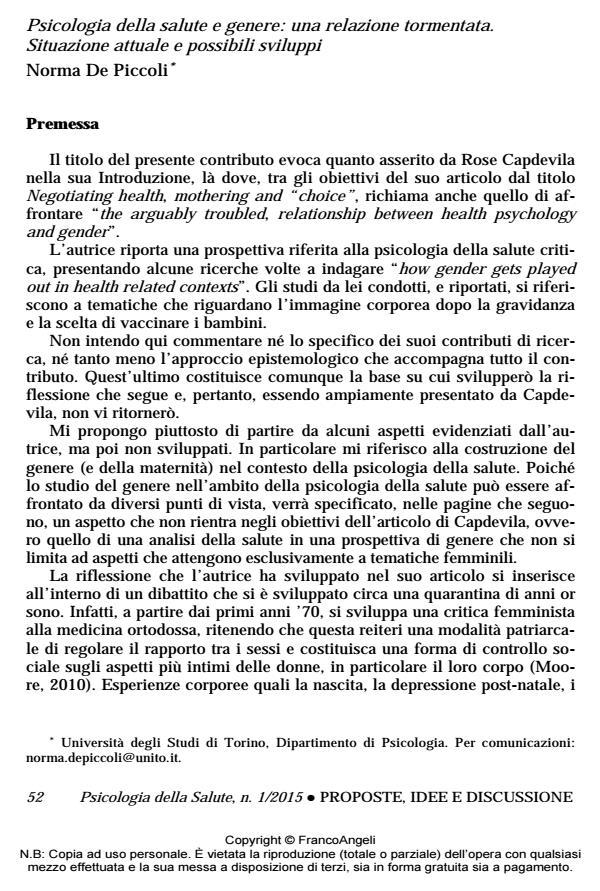Psicologia della salute e genere: una relazione tormentata. Situazione attuale e possibili sviluppi
Titolo Rivista PSICOLOGIA DELLA SALUTE
Autori/Curatori Norma De Piccoli
Anno di pubblicazione 2015 Fascicolo 2015/1 Lingua Italiano
Numero pagine 7 P. 52-58 Dimensione file 49 KB
DOI 10.3280/PDS2015-001006
Il DOI è il codice a barre della proprietà intellettuale: per saperne di più
clicca qui
Qui sotto puoi vedere in anteprima la prima pagina di questo articolo.
Se questo articolo ti interessa, lo puoi acquistare (e scaricare in formato pdf) seguendo le facili indicazioni per acquistare il download credit. Acquista Download Credits per scaricare questo Articolo in formato PDF

FrancoAngeli è membro della Publishers International Linking Association, Inc (PILA)associazione indipendente e non profit per facilitare (attraverso i servizi tecnologici implementati da CrossRef.org) l’accesso degli studiosi ai contenuti digitali nelle pubblicazioni professionali e scientifiche
Health Psychology and gender: a troubled relationship. Current situation and possible developments This article is based on the contribution of Rose Capdevila; in particular to the construction of gender and motherhood in the context of health psychology but with a specific focus on "gender and health". According to the different meanings attributed to the concept of sex (referred to biological factors) and gender (which refers to the socio-cultural construction of sex), it is emphasized that dealing with health / disease in a gender perspective does not mean deal only issues that relate specifically to the female sex, but involves all the biopsycho- social dimensions that occur differently for men and women. The gender medicine, which is presented in the article, aims to develop research, both medical and pharmacological, in order to obtain a more effective and appropriate therapeutic proposal, and to specify, for the two gender, bio-psycho-social factors underlying the different rates of mortality and morbidity. On these topics, health psychology could bring interesting contributions by expanding the research and the psychosocial reflection. In conclusion, the article considers that a transdisciplinary perspective is necessary to develop the knowledge on these issues and to guarantee policies favoring health and wellbeing.;
- Andersson J., Verdonk P., Johansson E.E., Lagro-Janssen T. and Hamberg K. (2012). Comparing gender awareness in Dutch and Swedish first-year medical students – results from a questionnaire. BMC Medical Education 2012, 12: 3. DOI: 10.1186/1472-6920-1
- Courtenay W.H. (2000). Constructions of masculinity and their influence on men’s wellbeing: a theory of gender and health. Social Science and Medicine, 50 (10): 1385-1401. DOI: 10.1016/S0277-9536(99)00390-
- Denton M., Prus S. and Walters V. (2004). Gender Differences in Health: A Canadian Study of the Psychosocial, Structural and Beahvioural Determinants of Health. Social Science and Medicine, 58: 2585-600. DOI: 10.1016/j.socscimed.2003.09.00
- De Piccoli N. (2007). Individui e contesti in psicologia di comunità [Individuals and contexts in community psychology]. Milano: Unicopli.
- De Piccoli N. (a cura di) (2014). Salute e qualità della vita nella società del benessere. Prospettive interdisciplinary [Health and quality of life in the society of wellbeing. Interdisciplinary perspectives]. Roma: Carocci
- Lagro-Janssen T. (2007). Sex, Gender and Health: Developments in Research. European Journal of Women’s Studies, 14 (1): 9-20. DOI: 10.1177/135050680707231
- Moore S.E.H. (2010). Is the Healthy Body Gendered? Toward a Feminist Critique of the New Paradigm of Health. Body and Society, 16 (2): 95-118. DOI: 10.1177/1357034X1036476
- Rollero C. (2014). Salute in una prospettiva di genere [Health in a gender perspective]. In: De Piccoli N. (a cura di). Salute e qualità della vita nella società del benessere. Prospettive interdisciplinari. Roma: Carocci, pp. 217-232.
- Rollero C., Gattino S. and De Piccoli N. (2014). A Gender Lens on Quality of Life: The Role of Sense of Community, Perceived Social Support, Self-Reported Health and Income. Social Indicators Research, 11: 887-898. DOI: 10.1007/s11205-013-0316-
- Risberg G., Johansson E.E. and Hamberg K. (2009). A theoretical model for analysing gender bias in medicine. International Journal for Equity in Health, 8: 28. DOI: 10.1186/1475-9276-8-2
- Verdonk P., Benschop Y.W.M., de Haes H.C.J.M. and Lagro-Janssen T.L.M. (2009). From
- gender bias to gender awareness in medical education. Advances in Health Science Education, 14: 135-152.
- World Health Organization, Commission on Social Determinants of Health (2008). Closing the gap in a generation.
- The Caregiving Experiences of Fathers and Mothers of Children With Rare Diseases in Italy: Challenges and Social Support Perceptions Paola Cardinali, Laura Migliorini, Nadia Rania, in Frontiers in Psychology 1780/2019
DOI: 10.3389/fpsyg.2019.01780 - Assertività e soddisfazione degli studenti nelle transizioni scolastiche: una ricerca nella scuola secondaria superiore Maria Luisa Pedditzi, Marcello Nonnis, Davide Massidda, in PSICOLOGIA DELLA SALUTE 2/2016 pp.43
DOI: 10.3280/PDS2016-002003 - Quando il caregiving è maschile: uno studio qualitativo sui partner di donne affette da sclerosi multipla Chiara Rollero, in PSICOLOGIA DELLA SALUTE 1/2019 pp.85
DOI: 10.3280/PDS2019-001005
Norma De Piccoli, Psicologia della salute e genere: una relazione tormentata. Situazione attuale e possibili sviluppi in "PSICOLOGIA DELLA SALUTE" 1/2015, pp 52-58, DOI: 10.3280/PDS2015-001006